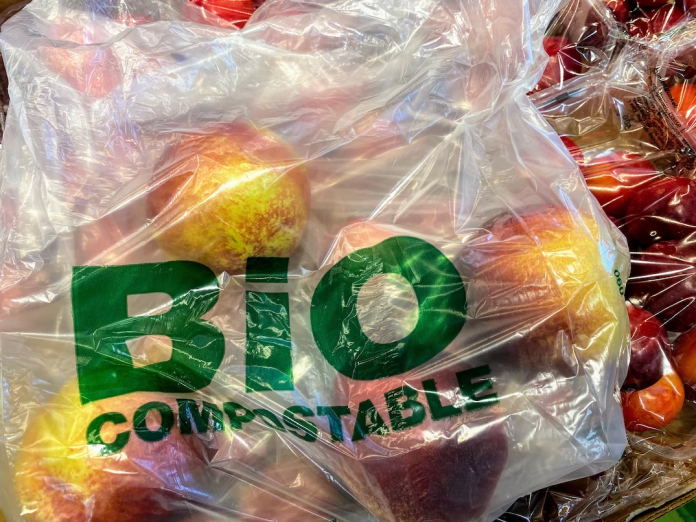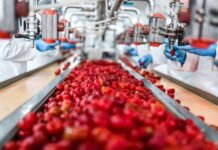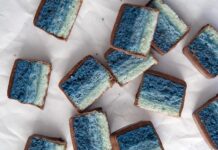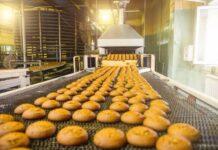
Plastic has become an indispensable material for the food industry. In addition to fresh foods being wrapped in plastic for protection, a growing number of people are turning to frozen foods and convenience meals. Mountains of films are now responsible for not only keeping the goods fresh, but also protecting them from the transfer of undesirable substances.
As part of the government-funded Green research project, manroland Goss, as part of a consortium, wants to provide a remedy in the future for plastic consumption in the freezer, among other things. A bio-based barrier is currently being developed that protects food from external influences while keeping it fresh.
Tackles plastic mania in freezer
The trend of frozen food continues to grow and with it the demand for ever larger quantities of plastic; no matter if it is the film around frozen pizza or the plastic bag around French fries. Despite their thin processing, the influences in the life-cycle analysis are obvious due to the high quantities and their increasing demand. Yet only about half of these packaging remnants are recycled. In Germany, this results in approximately 38 kg of plastic waste per person every year. manroland Goss is therefore launching the Green project as a consortium partner to significantly reduce the use of plastics in the food industry.
Funding project
At the end of 2022, the German Federal Ministry of Agriculture and Food approved the funding application for the Green project, marking its official starting point. Due to the central relevance of the topic of making the packaging industry more sustainable, Green established the company Coatible. manroland Goss holds a quarter of the shares in this specially-founded company.
Biodegradable barrier solutions
Plastic films are primarily used because they provide protection for the product and its packaging. As a mineral oil and water vapor barrier, the newly developed barrier is intended to provide equivalent protection against contamination with unwelcome substances — with the key difference that it massively reduces plastic.
Machines, barrier coating and coating
The project is initially focused on reducing the plastic films wrapped around frozen pizzas. However, the development of a bio-based, degradable barrier also lays the foundation for the development of food barriers outside the freezer cabinet. Concrete components of the project are the development of a barrier coating, a coating process, and a new type of machine for applying the coating. The commercialization of the coated cardboard is also the focus. Furthermore, the objective was developed from the perspective of the end consumer: The replacement of the plastic film should not lead to any functional disadvantages.
manroland Goss a cooperation partner
As a co-founder, manroland Goss is implementing the Green cooperation project in collaboration with GPD Foodpackaging and other experts. Here, the press manufacturer is taking over the project management in the development of the barrier application process and in the creation of a prototype. As an expert in the printing press industry, manroland Goss is primarily responsible for testing barrier coatings in the application process.
The expertise in spraying and printing technology in particular enables manroland Goss to carry out complex test procedures and to generate an application technology of the highest quality. The final goal is an integrated and automated system with a process technology that perfectly goes hand in hand with the developed barrier.
IndiFoodBev — authentic, impactful and influential
An English-language food and beverage processing and packaging industry B2B platform in print and web, IndiFoodBev is in its third year of publication. It is said that the Indian food and beverage industries represent approximately US$ 900 billion in revenues which implies more than 20% of the country’s GDP. Eliminating the wastage on the farmside can help to deliver more protein to a higher number of the population apart from generating sizable exports. The savings in soil, seeds, water, fertilizer, energy and ultimately food and nutrition could be the most immense contribution that country is poised to make to the moderation of climate change.
To improve your marketing and grow sales to the food and beverage processing and packaging industry, talk to us. Our research and consulting company IppStar [www.ippstar.org] can assess your potential and addressable markets in light of the competition. We can discuss marketing, communication, and sales strategies for market entry and growth.
Suppliers and service providers with a strategy and budget for targeted marketing can discuss using our hybrid print, web, video, and social media channels to create brand recognition linked to market relevance. Our technical writers are ready to meet you and your customers for content.
The second largest producer of fruit and vegetables in the world is continuously expanding processing capacities and delivery systems with appropriate innovative technologies. We cover product and consumer trends, nutrition, processing, research, equipment and packaging from farm to thali. Get our 2025 media kit and recalibrate your role in this dynamic market. Enhance your visibility and relevance to existing markets and turn potential customers into conversations. Ask for a sample copy of our bi-monthly in print or our weekly IndiFoodBev eZine each Wednesday.
For editorial info@ippgroup.in — for advertisement ads1@ippgroup.in and for subscriptions subscription@ippgroup.in
Naresh Khanna – 10 February 2025
Subscribe Now










